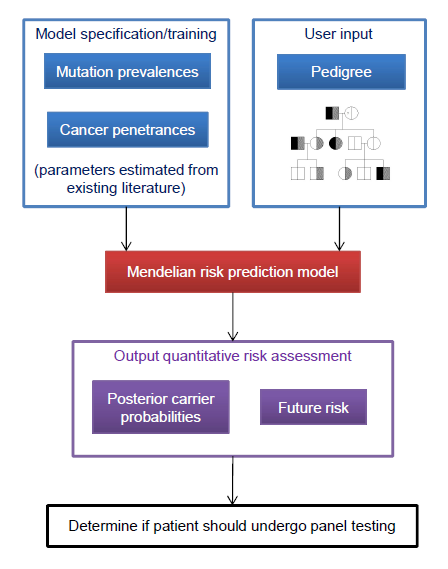Jane Liang
Research Scientist at Kaiser Permanente Division of Research
PanelPRO
Risk evaluation to identify individuals who are at greater risk of cancer as a result of heritable pathogenic variants is a valuable component of personalized clinical management. Using principles of Mendelian genetics, Bayesian probability theory, and variant-specific knowledge, Mendelian models derive the probability of carrying a pathogenic variant and future cancer risk, based on family history.

Existing Mendelian models have been widely adopted, but are generally limited to specific genes and syndromes. However, the rise of multi-gene panel germline testing has spurred the discovery of many new gene-cancer associations that are not currently accounted for in these models.
The BayesMendel Lab presents PanelPRO, a flexible, efficient Mendelian risk prediction framework that incorporates an arbitrary number of genes and cancers, overcoming the computational challenges that arise because of the increased model complexity. Using simulations and a high-risk clinical cohort with germline panel testing data 1, we evaluate model performance, validate the reverse-compatibility of our approach with existing Mendelian models, and illustrate its usage.
A clinical validation of PanelPRO-22, a 22-gene and 17-cancer model, is in progress.
Liang, J. W., Idos, G. E., Hong, C., Gruber, S. B., Parmigiani, G., & Braun, D. (2022). Statistical methods for Mendelian models with multiple genes and cancers. Genetic Epidemiology. doi: 10.1002/gepi.22460.
Lee, G.*, Liang, J. W.*, Zhang, Q., Huang, T., Choirat, C., Parmigiani, G., & Braun, D. (2021). Multi-syndrome, multi-gene risk modeling for individuals with a family history of cancer with the novel R package PanelPRO. eLife, 10, e68699. doi: 10.7554/eLife.68699.
PanelPRO: R package for running multi-gene, multi-cancer Mendelian risk prediction models.
Supplemental code: R code used to analyze the results and reproduce the figures in Liang et al. (2021).
Insight article “Risk Modeling: Predicting cancer risk based on family history” written by Michelle F Jacobs on Lee et al. (2021).
* indicates equal contributions
-
Idos, G. E., Kurian, A. W., Ricker, C., Sturgeon, D., Culver, J. O., Kingham, K. E., … & Gruber, S. B. (2019). Multicenter prospective cohort study of the diagnostic yield and patient experience of multiplex gene panel testing for hereditary cancer risk. JCO Precision Oncology, 3, 1-12. ↩